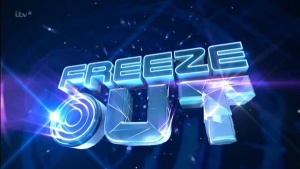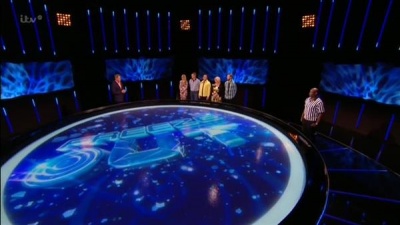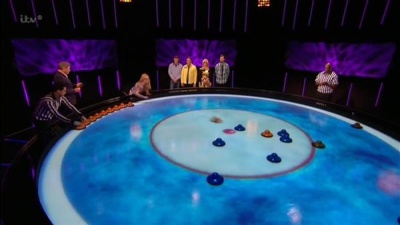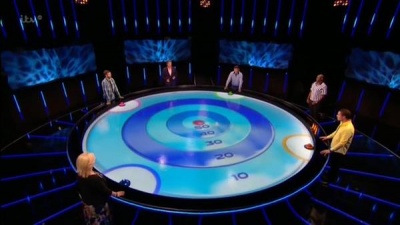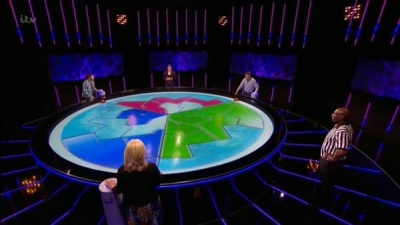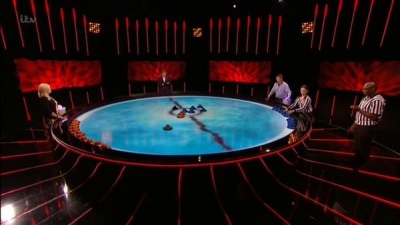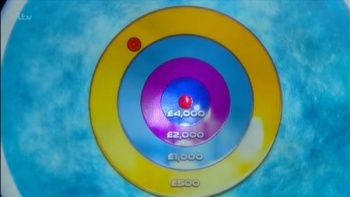Freeze Out
| Line 20: | Line 20: | ||
A combination of quiz and throwing things on an ice table. | A combination of quiz and throwing things on an ice table. | ||
| + | |||
| + | <div class=image>[[File:Freeze out studio.jpg|400px]]''The set.''</div> | ||
Mark Durden-Smith is joined by five contestants for this hour-long show. They play the opening round, '''Smash Out''', as individuals. Seven blue targets are in the middle of a circle on the ice table. The targets – "sliders", in Freeze Out lingo – are lightweight plastic disks with a grip on top. Players could throw one orange sliders for each correct answer, hoping to strike the blue targets. The round ended once all the blue sliders were out of the circle, or 90 seconds had elapsed. Worst performer leaves with nothing. | Mark Durden-Smith is joined by five contestants for this hour-long show. They play the opening round, '''Smash Out''', as individuals. Seven blue targets are in the middle of a circle on the ice table. The targets – "sliders", in Freeze Out lingo – are lightweight plastic disks with a grip on top. Players could throw one orange sliders for each correct answer, hoping to strike the blue targets. The round ended once all the blue sliders were out of the circle, or 90 seconds had elapsed. Worst performer leaves with nothing. | ||
| Line 26: | Line 28: | ||
Round two is '''Centre Slide'''. The four remaining contestants each have one slider, and they're asked to get it as close as possible to the centre. Players can target each other's sliders, and move them like in a game of curling. After each player has thrown their slider, they're asked a question. Get it right, and they score the points from where the centre of the slider has come to rest. Get it wrong, and there's no score. Repeat so everyone throws last, and lowest total score is off the show. | Round two is '''Centre Slide'''. The four remaining contestants each have one slider, and they're asked to get it as close as possible to the centre. Players can target each other's sliders, and move them like in a game of curling. After each player has thrown their slider, they're asked a question. Get it right, and they score the points from where the centre of the slider has come to rest. Get it wrong, and there's no score. Repeat so everyone throws last, and lowest total score is off the show. | ||
| + | |||
| + | <div class=image>[[File:Freeze out centre slide.jpg|400px]]''No wonder the BBC reject this as a Sport Relief celebrity series.''</div> | ||
Half way through, and we've reached '''Ice breaker'''. Players were asked questions on the buzzers: a right answer allows that player to launch one of their own sliders, a wrong answer lets the other two fire their sliders. The objective was to land a slider on each of eight irregular areas. Sliders that straddled two or three areas would clear all of those "shards", and a slider could clear ice for any player, not just whoever threw it. First two to clear their areas make the final. | Half way through, and we've reached '''Ice breaker'''. Players were asked questions on the buzzers: a right answer allows that player to launch one of their own sliders, a wrong answer lets the other two fire their sliders. The objective was to land a slider on each of eight irregular areas. Sliders that straddled two or three areas would clear all of those "shards", and a slider could clear ice for any player, not just whoever threw it. First two to clear their areas make the final. | ||
| Line 32: | Line 36: | ||
'''Face off''' found the daily winner. More questions on the buzzer, and each correct answer (or error by the opponent) allows a player to fire one slider into play. The winner will be whoever has most of their sliders in a small centre circle after two minutes of play. | '''Face off''' found the daily winner. More questions on the buzzer, and each correct answer (or error by the opponent) allows a player to fire one slider into play. The winner will be whoever has most of their sliders in a small centre circle after two minutes of play. | ||
| + | |||
| + | <div class=image>[[File:Freeze out face off.jpg|400px]]''It's time to d-d-d-d-d-d-d-d-duel.''</div> | ||
The winner goes through to play the final. A minute of questions, each right answer earns a slider. Fire these sliders at rings marked on the ice table: £500, then £1000, £2000, £4000, and a centre button worth £10,000. The slider must land entirely in a single ring to win its value. Should the player win £1000, that prize is safe: otherwise, the winner decides whether to play on or take the cash. Winning sliders are returned, so the minute of questions is to build up failures in the prize round. | The winner goes through to play the final. A minute of questions, each right answer earns a slider. Fire these sliders at rings marked on the ice table: £500, then £1000, £2000, £4000, and a centre button worth £10,000. The slider must land entirely in a single ring to win its value. Should the player win £1000, that prize is safe: otherwise, the winner decides whether to play on or take the cash. Winning sliders are returned, so the minute of questions is to build up failures in the prize round. | ||
| - | <div class=image>[[File:Freeze out | + | <div class=image>[[File:Freeze out final.jpg|350px|Freeze Out]]''Let's see what you could've won.''</div> |
An interesting format, ''Freeze Out'' was compromised by two flaws. Close decisions were made by Uriah Rennie, the "Ice Judge". He was asked to play a lack-of-comedy foil to Mark Durden-Smith - a humourless grouch, who would only talk about the game. It made the show feel unwelcoming and undermined Durden-Smith. Also, the £10,000 prize was almost impossible to win - the target was little larger than the slider, and no-one would seriously consider it. | An interesting format, ''Freeze Out'' was compromised by two flaws. Close decisions were made by Uriah Rennie, the "Ice Judge". He was asked to play a lack-of-comedy foil to Mark Durden-Smith - a humourless grouch, who would only talk about the game. It made the show feel unwelcoming and undermined Durden-Smith. Also, the £10,000 prize was almost impossible to win - the target was little larger than the slider, and no-one would seriously consider it. | ||
Revision as of 20:29, 20 January 2016
Contents |
Host
Co-hosts
Referee: Uriah Rennie
Broadcast
Talkback for ITV, 3 to 14 August 2015 (10 episodes in 1 series)
Synopsis
A combination of quiz and throwing things on an ice table.
Mark Durden-Smith is joined by five contestants for this hour-long show. They play the opening round, Smash Out, as individuals. Seven blue targets are in the middle of a circle on the ice table. The targets – "sliders", in Freeze Out lingo – are lightweight plastic disks with a grip on top. Players could throw one orange sliders for each correct answer, hoping to strike the blue targets. The round ended once all the blue sliders were out of the circle, or 90 seconds had elapsed. Worst performer leaves with nothing.
Round two is Centre Slide. The four remaining contestants each have one slider, and they're asked to get it as close as possible to the centre. Players can target each other's sliders, and move them like in a game of curling. After each player has thrown their slider, they're asked a question. Get it right, and they score the points from where the centre of the slider has come to rest. Get it wrong, and there's no score. Repeat so everyone throws last, and lowest total score is off the show.
Half way through, and we've reached Ice breaker. Players were asked questions on the buzzers: a right answer allows that player to launch one of their own sliders, a wrong answer lets the other two fire their sliders. The objective was to land a slider on each of eight irregular areas. Sliders that straddled two or three areas would clear all of those "shards", and a slider could clear ice for any player, not just whoever threw it. First two to clear their areas make the final.
Face off found the daily winner. More questions on the buzzer, and each correct answer (or error by the opponent) allows a player to fire one slider into play. The winner will be whoever has most of their sliders in a small centre circle after two minutes of play.
The winner goes through to play the final. A minute of questions, each right answer earns a slider. Fire these sliders at rings marked on the ice table: £500, then £1000, £2000, £4000, and a centre button worth £10,000. The slider must land entirely in a single ring to win its value. Should the player win £1000, that prize is safe: otherwise, the winner decides whether to play on or take the cash. Winning sliders are returned, so the minute of questions is to build up failures in the prize round.
An interesting format, Freeze Out was compromised by two flaws. Close decisions were made by Uriah Rennie, the "Ice Judge". He was asked to play a lack-of-comedy foil to Mark Durden-Smith - a humourless grouch, who would only talk about the game. It made the show feel unwelcoming and undermined Durden-Smith. Also, the £10,000 prize was almost impossible to win - the target was little larger than the slider, and no-one would seriously consider it.
Catchphrases
"Slide on", repeated every 20 seconds through the show.
Inventor
Devised by: Simon Craig, Stefan Harte, Nick Jarvie
Title music
Music composed by Will Slater
Trivia
Recorded at BBC Elstree, the ice arena was provided by Cousins Entertainment.
Somewhat optimistically, Talkback described this show as "the first quiz show on ice". Do they expect to re-make Russian Roulette on the frozen stuff?
Aired at 5pm, as summer replacement for The Chase. August 2015 also saw two weeks of Rebound.

